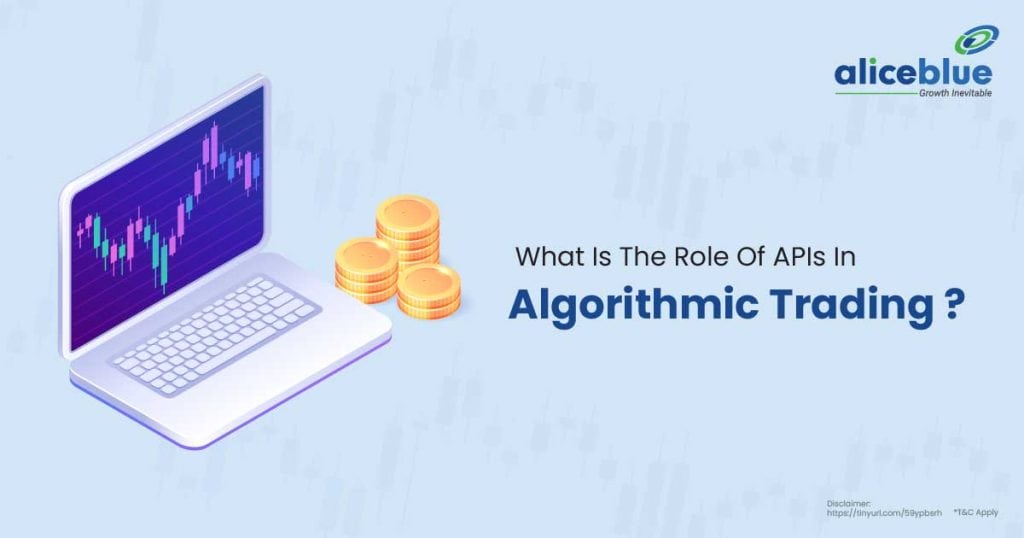APIs play a crucial role in algorithmic trading by enabling seamless communication between trading platforms and automated systems. They provide real-time access to market data, execute trades instantly, and ensure efficient integration of algorithms, enhancing trading speed, accuracy, and strategy execution for better outcomes.
Contents:
- What Are APIs in Algo Trading?
- How Are APIs Used in Algo Trading?
- Role of APIs in Algorithmic Trading
- Importance of APIs in Algorithmic Trading
- Advantages of APIs in Algorithmic Trading
- Disadvantages of APIs in Algorithmic Trading
- Role of APIs In Algorithmic Trading – Quick Summary
- What Is The Role Of APIs In Algorithmic Trading? – FAQs
What Are APIs in Algo Trading?
APIs, or Application Programming Interfaces, are tools that connect trading platforms with algorithmic systems. They enable automated systems to access market data and execute trades directly. This connection helps streamline trading processes and improves efficiency for the traders and investors.
APIs are the foundation of algorithmic trading, providing real-time data flow and enabling smooth execution of trades. They act as intermediaries, facilitating seamless interaction between trading platforms and automated systems. By ensuring uninterrupted access to live market data, APIs empower algorithms to continuously monitor market movements and respond instantly to changes. This capability is crucial in the fast-paced trading environment, where even a fraction of a second can impact profitability.
APIs allow algorithms to analyze trends and patterns efficiently, using predefined strategies to identify opportunities or risks. Once an opportunity is identified, APIs help the system to execute orders instantly, without manual intervention. Additionally, they integrate trading systems with brokers’ platforms, ensuring that instructions for buying or selling securities are carried out precisely and on time. This level of accuracy and speed minimizes human error, reduces delays, and maximizes trading efficiency, making APIs indispensable in modern algorithmic trading.

How Are APIs Used in Algo Trading?
APIs in algorithmic trading act as a bridge between trading platforms and automated systems. They enable algorithms to access real-time market data, analyze trends, and execute trades automatically. This integration ensures efficiency and accuracy, eliminating manual intervention in the trading process.
- Real-Time Market Data Access: APIs fetch live market data, including stock prices, order books, and trading volumes. This data allows algorithms to monitor markets continuously and analyze patterns in real time. With accurate and instant access to information, traders can identify opportunities and risks promptly, enabling swift action in dynamic markets.
- Automated Trade Execution: APIs execute buy or sell orders automatically based on pre-set strategies. They ensure that trades are carried out instantly and accurately without manual input. This reduces delays and minimizes errors, crucial for capturing opportunities in highly volatile markets where every second counts.
- Order Management and Modification: APIs simplify order management by enabling algorithms to place, modify, or cancel orders as needed. This flexibility helps traders adapt to sudden market changes or adjust strategies in real-time. It ensures better control over trades, reducing potential losses and enhancing overall trading efficiency.
- Risk Management Integration: APIs support risk assessment by delivering insights into portfolio performance and market exposure. They help algorithms evaluate potential risks before executing trades. This ensures that traders can maintain a balanced portfolio and avoid overexposure to volatile assets or market downturns.
- Multi-Platform Scalability: APIs allow algorithms to operate across multiple platforms and markets simultaneously. Traders can deploy different strategies in various asset classes without any kind of manual intervention. This scalability enhances diversification and opens opportunities in global markets, making trading more efficient and profitable.
Role of APIs in Algorithmic Trading
The primary role of APIs in algorithmic trading is to enable seamless communication between trading systems and financial platforms. They provide real-time data, automate trade execution, and support risk management. APIs ensure efficiency, speed, and precision, making them essential for effective trading operations.
- Real-Time Data Delivery: APIs supply continuous streams of real-time market data to algorithms, including stock prices, order book information, and trading volumes. This ensures that trading systems stay updated with current market conditions. Accurate data is vital for timely decision-making and enhances the effectiveness of trading strategies.
- Automating Trade Execution: APIs execute trades instantly based on algorithmic triggers. This eliminates delays caused by manual processes, ensuring trades occur at the right moment. By automating the execution, APIs reduce the chances of human error and improve consistency in implementing trading strategies.
- Order Tracking and Management: APIs track the status of the active orders and allow modifications or cancellations when necessary. This particular feature helps traders adapt quickly to changing market conditions. Effective order management minimizes the risks and ensures strategies remain aligned with market movements.
- Improving Scalability: APIs allow algorithms to operate on multiple platforms and across various markets simultaneously. This scalability lets traders diversify their strategies and access opportunities in global markets. It also ensures that high volumes of trade are managed efficiently without additional manual intervention.
- Integrating Risk Management Tools: APIs provide tools for monitoring portfolio performance and assessing risks associated with market volatility. By offering real-time insights into potential risks, APIs help traders protect their portfolios and maintain balanced exposure. This integration ensures that trading strategies are both aggressive and controlled.
Importance of APIs in Algorithmic Trading
The fundamental importance of APIs in algorithmic trading lies in their ability to provide real-time data access, which ensures timely decision-making. They deliver accurate market information instantly, enabling algorithms to analyze trends and execute strategies effectively without delays, maximizing trading efficiency.
- Instant Market Updates: APIs provide continuous streams of real-time market data, including stock prices, trading volumes, and market trends. This ensures that traders always have the most current information to make quick decisions. Instant updates help algorithms adjust to rapid market changes and capture short-term opportunities.
- Improved Strategy Execution: APIs enable precise implementation of trading strategies by ensuring timely access to essential data. Algorithms rely on this data to trigger orders at optimal moments. This seamless flow of information reduces lag and ensures trades are executed as planned, improving overall strategy performance.
- Minimizing Manual Errors: APIs eliminate the need for manual data entry or trade execution, reducing the risk of human errors. Automated processes ensure that trading systems operate consistently and accurately. This reliability is critical in volatile markets where even small mistakes can result in significant losses.
- Facilitating Scalability: APIs allow traders to manage multiple strategies and operate in different markets simultaneously. This scalability enables the deployment of diverse trading techniques across asset classes, optimizing returns. By handling high volumes efficiently, APIs ensure that expanding operations remain seamless and effective.
- Better Portfolio Monitoring: APIs provide real-time insights into portfolio performance and risk exposure. This helps traders evaluate the impact of market fluctuations on their investments. These kinds of insights allow for better portfolio adjustments, ensuring balanced positions and controlled risk in fast-moving markets.
Advantages of APIs in Algorithmic Trading
The main advantage of APIs in algorithmic trading is their ability to automate trading operations, ensuring faster and more accurate execution. By eliminating manual processes, APIs enhance efficiency, reduce errors, and enable algorithms to capitalize on market opportunities in real-time.
- Better Speed of Execution: APIs enable algorithms to execute trades instantly based on pre-defined triggers. This speed is critical in fast-moving markets where opportunities can vanish within seconds. Faster execution minimizes the chances of slippage, ensuring trades are completed at desired prices for optimal outcomes.
- Consistency in Trading Strategies: APIs ensure that trading strategies are executed consistently without any kind of deviation. They automate the process, reducing reliance on human decision-making. This consistency helps maintain discipline in trading, ensuring that algorithms stick to the planned approach regardless of market fluctuations.
- Seamless Integration with Platforms: APIs connect trading systems with multiple platforms, helping in smooth data exchange and trade execution. This integration supports various functionalities, such as accessing market data, managing orders, and tracking portfolio performance, which in turn makes trading operations seamless and more effective.
- Scalability for Multi-Market Operations: APIs support trading in multiple markets and asset classes all at the same time. This scalability allows traders to diversify strategies and take advantage of global opportunities. By handling complex operations efficiently, APIs make it easier to expand trading activities without compromising performance.
- Effective Risk Management: APIs provide tools to monitor market risks and assess portfolio performance in real-time. They help algorithms adjust strategies based on risk exposure, ensuring a balanced and controlled trading approach. This capability protects investments and enhances the long-term profitability of trading activities.
Disadvantages of APIs in Algorithmic Trading
The primary disadvantage of APIs in algorithmic trading is the potential for system failures. Since APIs rely on external connections, any disruption in data flow or connectivity issues can lead to errors, delays, or even missed trading opportunities, affecting the overall performance of strategies.
- Risk of Connectivity Issues: APIs depend on stable internet connections and third-party platforms. If there is a network failure or connectivity issue, algorithms may fail to execute trades on time. This can lead to significant losses, especially in volatile markets where prices can change rapidly.
- Vulnerability to Market Manipulation: APIs can be vulnerable to cyber-attacks or manipulation, which can compromise trading systems. If APIs are not properly secured, they may expose algorithms to risks like data breaches or unauthorized trades. This makes it crucial to implement strong security measures to safeguard trading operations.
- Limited Control Over Data Sources: APIs rely on external data providers for real-time market information. If the data source is inaccurate or delayed, the algorithm’s decision-making process can be flawed. Traders have limited control over the quality and accuracy of the data provided through APIs, affecting the effectiveness of their strategies.
- Over-Reliance on Automation: While automation increases efficiency, over-reliance on APIs can lead to a lack of manual oversight. Algorithms can execute trades based on pre-set conditions without considering sudden market events or news. This makes it difficult for traders to intervene in case of unexpected situations, potentially leading to losses.
- High Initial Setup and Maintenance Costs: Setting up and maintaining APIs can require significant technical resources and costs. Developing custom integrations, ensuring security, and managing API connections can be expensive. Smaller traders or firms may face challenges in affording and maintaining the infrastructure needed to use APIs effectively in algorithmic trading.
Role of APIs In Algorithmic Trading – Quick Summary
- The main role of APIs in algorithmic trading is to provide seamless communication between trading systems and platforms, enabling real-time data access, automated trade execution, and efficient risk management for precise and timely trading operations.
- The primary purpose of APIs in algo trading is to connect trading systems with financial platforms, enabling algorithms to access live data and execute trades automatically, improving the overall efficiency of trading strategies.
- The key use of APIs in algo trading is to deliver real-time data, execute trades, manage orders, and integrate risk assessment tools, ensuring algorithms operate efficiently across platforms and adapt to dynamic market conditions.
- The primary role of APIs in algorithmic trading is to automate operations, provide live market data, and enable high-speed trade execution. All of these improves consistency and minimizing errors in trading processes.
- The main importance of APIs in algorithmic trading is their ability to deliver real-time data that powers fast and accurate decision-making, enabling traders to adapt to changing market conditions effectively.
- The key advantage of APIs in algorithmic trading is their ability to automate trading operations, ensuring faster execution, reducing errors, and enabling consistent application of trading strategies across multiple platforms and markets.
- The primary disadvantage of APIs in algorithmic trading is the risk of system failures and connectivity issues, which can delay trades or lead to missed opportunities, making reliable infrastructure and oversight essential.
- Maximize your trading efficiency with Alice Blue’s advanced API solutions. Streamline your algorithmic and manual trading strategies with seamless integration, real-time data, and precision execution. Start leveraging smarter trading tools today!

What Is The Role Of APIs In Algorithmic Trading? – FAQs
The main role of APIs in algorithmic trading is to enable real-time data access and automate trade execution. This ensures faster, accurate, and efficient trading processes for better strategy implementation.
Algo trading involves using computer programs to execute trades automatically based on pre-defined strategies. This kind of trading minimizes manual intervention and improves trading efficiency through speed, precision, and data-driven decisions.
Algo trading is suitable for institutional investors, retail traders, and financial firms with access to automated systems. It requires knowledge of coding or professional support for strategy development and execution.
Yes, algo trading is legal in India. It is regulated by SEBI, which sets guidelines for its usage by traders and brokers to ensure transparency and minimize any kind of market manipulation.
The primary benefit of APIs in trading is automation, which ensures faster execution, reduced errors, and seamless integration with platforms. They also improve access to real-time data for informed decision-making.
APIs improve risk management by offering real-time insights into market movements and portfolio performance. They help algorithms track exposures, assess risks, and adjust strategies swiftly, minimizing potential losses in volatile market conditions.
Yes, there are different types of APIs for trading, including market data APIs for live data, trading APIs for execution, and portfolio APIs for monitoring and managing the investments effectively.
APIs are preferred because they automate processes, reduce human errors, and ensure faster trade execution. They provide real-time data access, making them more efficient and reliable than any traditional methods.








